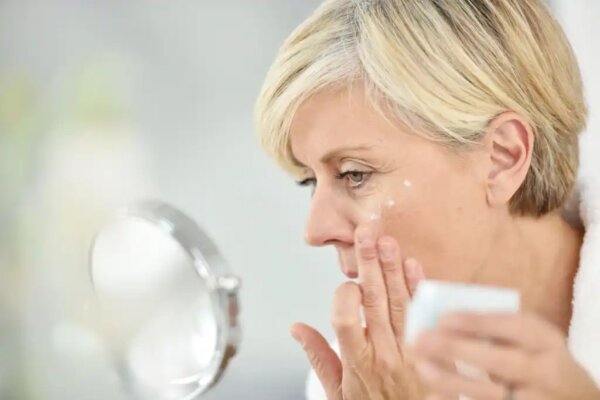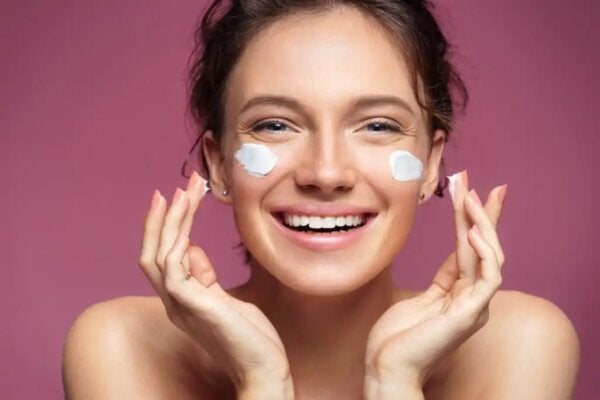Many people use cosmetics on a daily basis to take care of themselves and look better. Cosmetics pamper your skin, hair, and body and make you feel better about yourself. Based along these lines, neurocosmetics was born.
Neurocosmetics refers to traditional cosmetics with added benefits of the latest developments in the psychological sector. These developments tend to be aimed towards your emotional well-being. Therefore, neurocosmetics advocates argue that there’s a clear relationship between your skin and your brain.
However, what more do we know about neurocosmetics? What do they provide us with? In this article, we talk about what some of the experts think.
Neurocosmetics
Martinez-González (2015) conducted a study regarding cosmetic dermatology or aesthetic medicine. This is the area that specializes in skincare for cosmetic purposes. It can also be defined as “the technique for the manufacture and use of cosmetic substances or products”.
There are many different cosmetic products. They vary from perfumes, make-up, skin and body lotions, to hair dyes, shampoos, and conditioners, among others.
The goal of cosmetics is to beautify
Cosmetics are preparations that you apply to your body with the goal of preservation or beautification. Interestingly, in primitive times, they thought that cosmetics had a magical quality.
Traditionally, cosmetics have been oriented to the field of beauty, including make-up and skin health. However, there’s a new concept today. That of neurocosmetics, sometimes known as psychocosmetics.
These products seek to promote the connection between your skin and your brain. How? Through the hormones you secrete due to your emotional reaction to these products.
In short, neurocosmetics refers to certain beauty products you use to protect and care for your skin. However, it also involves the sense of well-being you feel thanks to the connection between your skin and your brain.
Products that stimulate the senses
There are currently laboratories working with neurocosmetics. They create products with psychoactive ingredients. These increase or inhibit the release of skin neuromediators.
According to these laboratories, substances can stimulate your emotions via your senses. These could be sight, touch, or smell. Esperança Figuerola is head of Research and Development at Neftis Laboratories.
Some expert opinions on neurocosmetics
Some mental health experts claim that there’s a real connection between your skin and your brain and that these organs go hand in hand. For this reason, emotions could well have an impact on your skin.
However, some psychologists warn that positive emotions involve far more than the mere sensations of pleasure provided by cosmetics. Furthermore, they claim that the term “neuro” or “psycho” shouldn’t be applied to cosmetics. They argue that, in this way, anything remotely related to emotions or hormones could use the same terms. Then, the terms start to become little more than marketing strategies. Furthermore, they don’t reflect reality at all. For this reason, many experts suggest such terms should be used with caution.
The influence of cosmetics and cosmetic surgery on mental health
Moving away slightly from neurocosmetics, we find the area of cosmetic surgery. This is where doctors carry out surgical interventions to change certain features of the face or body. The goal is to make the individual “look better” or “improve” themselves.
Van Soes et al. conducted a study at the University of Cambridge in 2011. They stated that there’s limited information available on the psychological effects of cosmetic surgery.
For this reason, it might be concluded that any mental health problems prior to cosmetic surgery don’t necessarily disappear after the procedure.
On the other hand, a study by Echarte (2009) regarding cosmetic pharmacology stated that neither psychiatrists nor parents of young people who resort to cosmetic procedures know what impact it may have on them.
However, not everyone agrees. In fact, the study by Martínez-González we mentioned earlier suggests that aesthetic and cosmetic dermatology has great potential in the improvement of young people’s feelings of well-being.
What does neurocosmetics provide?
Do neurocosmetics merely provide sensory pleasure by way of the smell of a nice cream, or do they provide genuine positive emotions and make you feel good?

Correct terminology
Without a doubt, cosmetics can make you feel both pleasure and excitement. However, is this enough to warrant the use of the term “neurocosmetics”? Surely not.
In reality, cosmetics can improve your well-being. However, you can’t equate this to the benefits of psychotherapy, for example. Indeed, the use of the prefix “psycho” here is justified for obvious reasons.
For many people, particularly mental health professionals, neurocosmetics are simply normal cosmetics with certain nuances. The concept is used to emphasize the connection between your skin and your brain and the benefits of looking after yourself.
As we’ve seen, neurocosmetics focuses on emotions through self-care and beauty. Clearly, the stimulation of your senses (smell, taste, and sight) can have a positive impact on your mood. However, this idea must be approached with caution.
Indeed, just because a cream makes you feel better doesn’t mean it’s a therapeutic tool. On the other hand, it’s true that looking after yourself is one of the techniques that certainly improve your emotional health. As you can see, opinions are divided on the topic of neurocosmetics.
Beauty is Accepting Who You Are
The post Neurocosmetics, a Link Between the Skin and the Brain appeared first on Exploring your mind.


















Comments